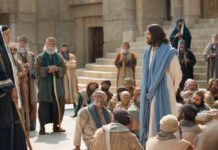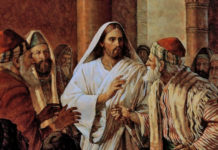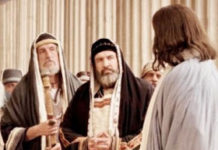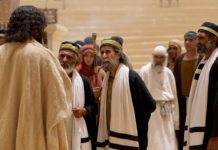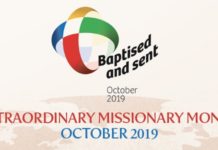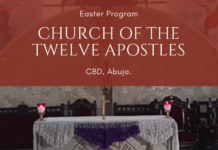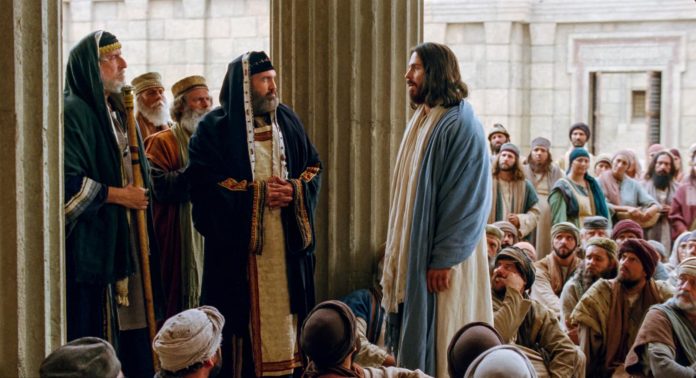FIRST READING
“You have said, ’My name shall be there,’ that you may listen to the prayer of your people Israel.”
A reading from the first Book of Kings (1 Kings 8:22-23.27-30)
In those days: Solomon stood before the altar of the Lord in the presence of all the assembly of Israel, and spread forth his hands towards heaven; and said, “O Lord, God of Israel, there is no God like you, in heaven above or on earth beneath, keeping covenant and showing mercy to your servants who walk before you with all their heart. But will God indeed dwell on the earth? Behold, heaven and the highest heaven cannot contain you; how much less this house which I have built! Yet have regard to the prayer of your servant and to his supplication, O Lord my God, listening to the cry and to the prayer which your servant prays before you this day; that your eyes may be open night and day towards this house, the place of which you have said, ‘My name shall be, there,’ that you may listen to the prayer which your servant offers towards this place. And listen to the supplication of your servant and of your people Israel, when they pray towards this place; yes, hear in heaven your dwelling place; and when you hear, forgive.”
The word of the Lord
RESPONSORIAL PSALM Psalm84:3, 4, 5 and 1 0, 11 (R. 2)
R/. How lovely is your dwelling place, O Lord of hosts!
My soul is longing and yearning
for the courts of the Lord.
My heart and my flesh cry out
to the living God. R/.
Even the sparrow finds a home,
and the swallow a nest for herself
in which she sets her young, at your altars,
O Lord of hosts, my king and my God. R/.
R/. How lovely is your dwelling place, O Lord of hosts!
Blessed are they who dwell in your house,
forever singing your praise.
Turn your eyes, O God, our shield;
look on the face of your anointed. R/.
One day within your courts
is better than a thousand elsewhere.
The threshold of the house of God
I prefer to the dwellings of the wicked. R/.
ALLELUIA Psalm 119:36a.29b
Alleluia. Bend my heart, O God, to your decrees, grant me mercy by your law. Alleluia.
GOSPEL
“You leave the commandment of God, and holdfast the tradition of’ men.”
A reading from the holy Gospel according to Mark (Mark 7:1-13)
At that time: When the Pharisees gathered together to Jesus, with some of the scribes, who had come from Jerusalem, they saw that some of his disciples ate with hands defiled, that is, unwashed. (For the Pharisees, and all the Jews, do not eat unless they wash their hands, observing the tradition of the elders; and when they come from the market place, they do not eat unless they purify themselves; there are many other traditions which they observe, the washing of cups and pots and vessels of bronze.) And the Pharisees and the scribes asked him, “Why do your disciples not live according to the tradition of the elders, but eat with hands defiled?” And he said to them, “Well did Isaiah prophesy of you hypocrites, as it is written, ‘This people honours me with their lips, but their heart is far from me; in vain do they worship me, teaching as doctrines the precepts of men.’ You leave the commandment of God, and hold fast the tradition of men.” And he said to them, “You have a fine way of rejecting the commandment of God, in order to keep your tradition! For Moses said, ‘Honour your father and your mother’; and ‘He who speaks evil of father or mother, let him surely die’; but you say, ‘If a man tells his father or his mother, what you would have gained from me is Corban’ (that is, given to God) — then you no longer permit him to do anything for his father or mother, thus making void the word of God through your tradition which you hand on. And many such things you do.”
The Gospel of the Lord
TODAY’S REFLECTION
Today Jesus has encountered a different set of people as audience. They are not interested in his message but rather, are more concerned about finding loopholes in whatever he does. These people are the Pharisees and the Scribes (Teacher). They are experts in the customs, laws and traditions of the people. And they care more about the preservation of those customs, laws and traditions than a sensible alteration to them. So when they noticed that the disciples of Jesus were eating without first washing their hands, they complained to Jesus. The rule is a merely hygiene related one, but the Pharisees and the Scribes have placed it on the pedestal of the sacred. Jesus reminded them that all those rules and traditions were merely man-made. Of course, knowing that they were all skeptical and laden with doubts, Jesus became defensive and dismissive of their complaint. We should not approach God with doubts, but rather with faith and trust. If we approach with doubts, we might not have the disposition to receive God’s grace.
